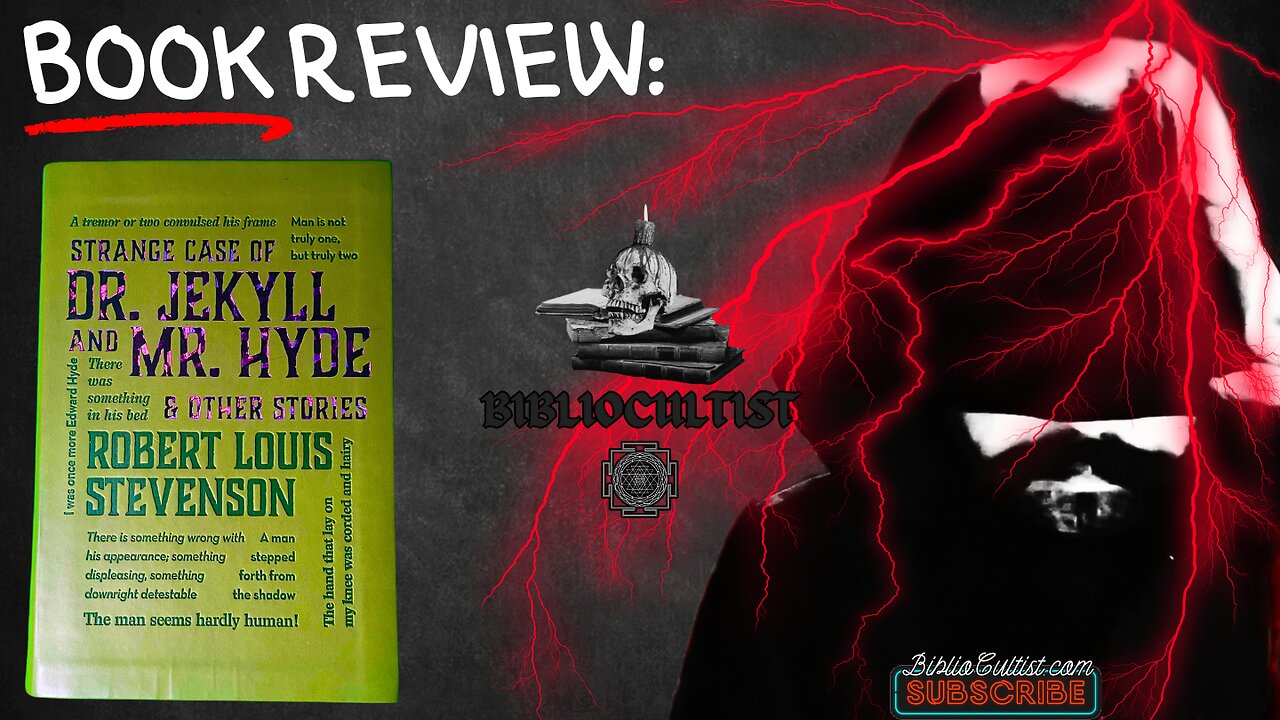Premium Only Content

Dr Jekyll, Murder, and Medieval Madness: Reviewing Stevenson’s Dark Tales of Duality & Danger
**DONATE HERE IF YOU WISH TO HELP FUND THIS PROJECT: http://ko-fi.com/bibliocultist**
In this #bookreview, I review a powerful collection featuring Strange Case of Dr Jekyll and Mr Hyde, The Suicide Club, The Rajah’s Diamond, The Pavilion on the Links, and A Lodging for the Night — stories united by danger, moral ambiguity, and the shadowy depths of human nature. Written as part of or inspired by Stevenson’s New Arabian Nights, these tales blend exotic adventure with Gothic horror, secret societies, split identities, and medieval violence, all wrapped in rich, atmospheric prose. I explore how Stevenson uses the frame of storytelling — one night, one tale — to probe deep philosophical questions: What happens when the soul and body separate? Can a man be both good and evil? And how thin is the line between civilization and chaos? From the foggy streets of London to the cold brutality of 15th-century France, this collection reveals Stevenson not just as a master of adventure, but as a pioneer of psychological fiction.
#RLStevenson #DrJekyllAndMrHyde #TheSuicideClub #TheRajahsDiamond #ThePavilionOnTheLinks #ALodgingForTheNight #NewArabianNights #ClassicLiterature #GothicFiction #PsychologicalHorror #VictorianLiterature #LiteraryAnalysis #DarkTales #MoralDuality #ClassicBooks #PhilosophicalFiction #booktok #booktube #biblio #cultist #bibliocultist
**SHOW NOTES**
1. Robert Louis Stevenson (1850–1894) was a Scottish writer whose innovative storytelling profoundly shaped modern literary genres. He is widely credited with inventing the modern adventure novel through Treasure Island (1883), a work that established enduring tropes of pirate lore—such as treasure maps, tropical islands, and the complex antihero—becoming a blueprint for generations of adventure fiction. His novella Strange Case of Dr Jekyll and Mr Hyde revolutionized Gothic and psychological fiction, introducing a powerful narrative of dual identity that influenced horror, science fiction, and existential literature, while embedding the concept of the "split self" into popular culture. A master of atmosphere, suspense, and moral ambiguity, Stevenson bridged Romanticism and modernism, leaving a lasting legacy on fantasy, horror, and adventure writing.
2. Robert Louis Stevenson didn’t just draw inspiration from One Thousand and One Arabian Nights — he deliberately set out to create a 19th-century Western version of it. In 1878, he published New Arabian Nights, a collection in which he openly declared his ambition: to craft a series of thrilling, interconnected tales framed within a narrative structure reminiscent of Scheherazade’s legendary storytelling. Like the original Arabian Nights, Stevenson’s work uses a layered format — stories told within stories, often over successive nights — uniting adventure, mystery, and moral ambiguity under a single literary spell. "The Suicide Club," "The Rajah’s Diamond," and "A Lodging for the Night" are all part of this deliberate project: not merely standalone tales, but chapters in Stevenson’s self-proclaimed New Arabian Nights.
3. During Robert Louis Stevenson’s time, a profound philosophical and scientific shift was underway regarding the human body: the growing view of it as a biological machine, governed by physical laws rather than sacred mystery. Influenced by advances in anatomy, physiology, and Darwinian evolution, many 19th-century thinkers began to see the body not as a temple of the soul, but as a complex mechanism that, once it ceased functioning, lost all intrinsic meaning or sanctity. This mechanistic worldview opened the door to widespread dissection, medical experimentation, and the clinical study of corpses—practices that had long been restricted by religious and cultural taboos.
4. In Christian theology, the body is not a mere vessel for the soul but an essential part of human identity. Unlike philosophies that view the body as a prison for the soul, orthodox Christianity teaches that the body is good, created by God, and destined for resurrection. After death, the soul may continue in an intermediate state, but this separation is incomplete and unnatural — the soul without the body is in a state of longing, not fulfillment. Full restoration comes only at the resurrection of the dead, when body and soul are reunited in glorified form, as affirmed in creeds like the Apostles’ and Nicene.
5. "A Lodging for the Night" by Robert Louis Stevenson is a work of historical fiction set in 15th-century France during a turbulent period marked by the aftermath of the Hundred Years' War and the reign of King Louis XI (r. 1461–1483), a central figure in the story. The tale captures the lawlessness and political intrigue of the late Middle Ages, a time when France was fragmented by feuding nobles, mercenary bands (routiers), and a weakened central authority struggling to consolidate power.
-
 LIVE
LIVE
vivafrei
42 minutes agoLiquid Death-Gate! Text Message-Gate! Ostrich-Gate! AND MORE!
11,468 watching -
 LIVE
LIVE
Right Side Broadcasting Network
6 hours agoLIVE: President Trump Hosts a Press Conference with FBI Director Kash Patel - 10/15/25
9,733 watching -
 1:26:01
1:26:01
The Quartering
2 hours agoYoung Republican Smear, Woke Sidewalks Washed Away, Major Changes To X & More
25.7K29 -
 LIVE
LIVE
Dr Disrespect
5 hours ago🔴LIVE - DR DISRESPECT - BATTLEFIELD 6 - THE PERFECT WEAPON
1,649 watching -
 LIVE
LIVE
Darkhorse Podcast
2 hours agoThe 296th Evolutionary Lens with Bret Weinstein and Heather Heying
276 watching -
 LIVE
LIVE
StoneMountain64
32 minutes agoI can't stop playing BATTLEFIELD 6
53 watching -
 LIVE
LIVE
Jeff Ahern
1 hour agoNever Woke Wednesday with Jeff Ahern
132 watching -
 1:24:59
1:24:59
Sean Unpaved
3 hours agoPrime Pulse: Yamamoto's Gem, Mendoza & Simpson's Title Quest, & NFL QB Rule Shift
14K1 -
 2:38:53
2:38:53
The Shannon Joy Show
4 hours agoCharlie Kirk Killing Exploited For Trump’s Everything War - Insurrection Against The Constitution
18.1K12 -
 10:54
10:54
Midwest Crime
3 hours agoTrain Platform Killer Caught on Camera
571